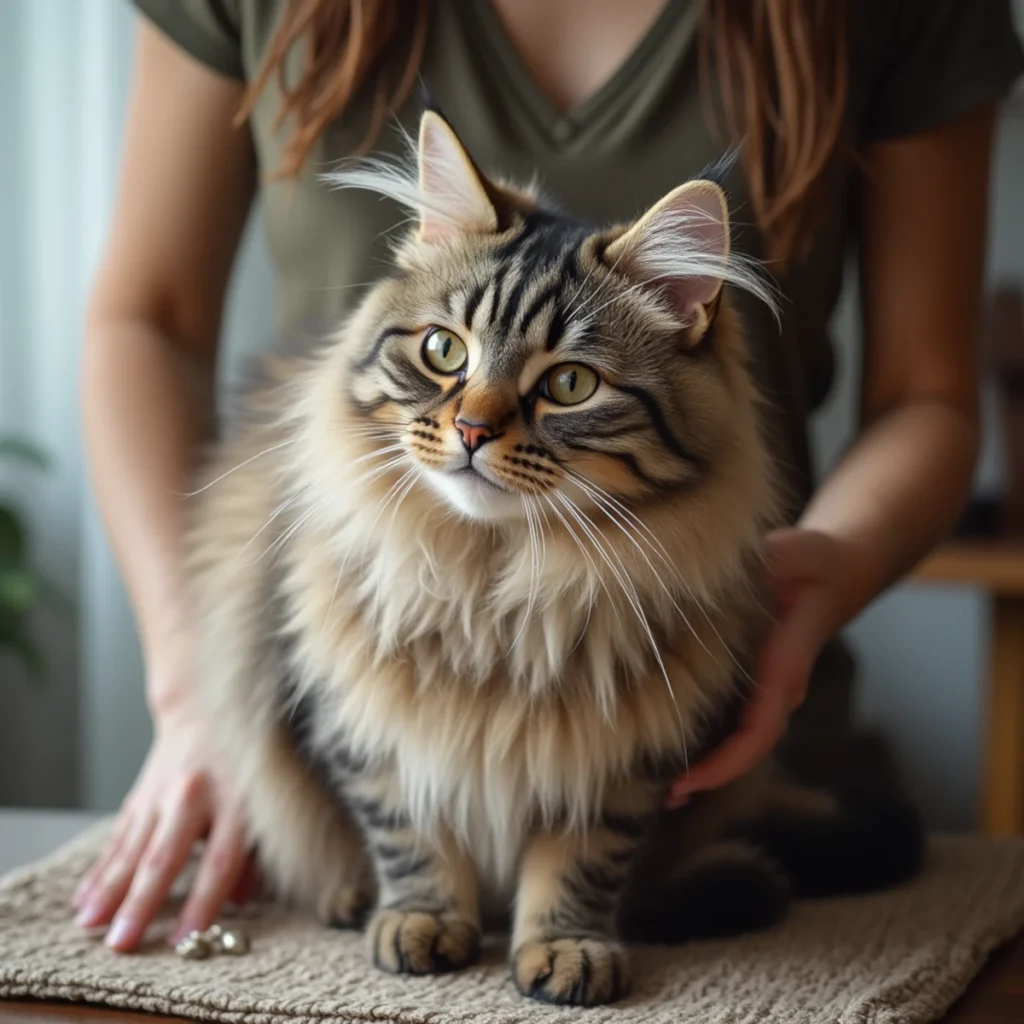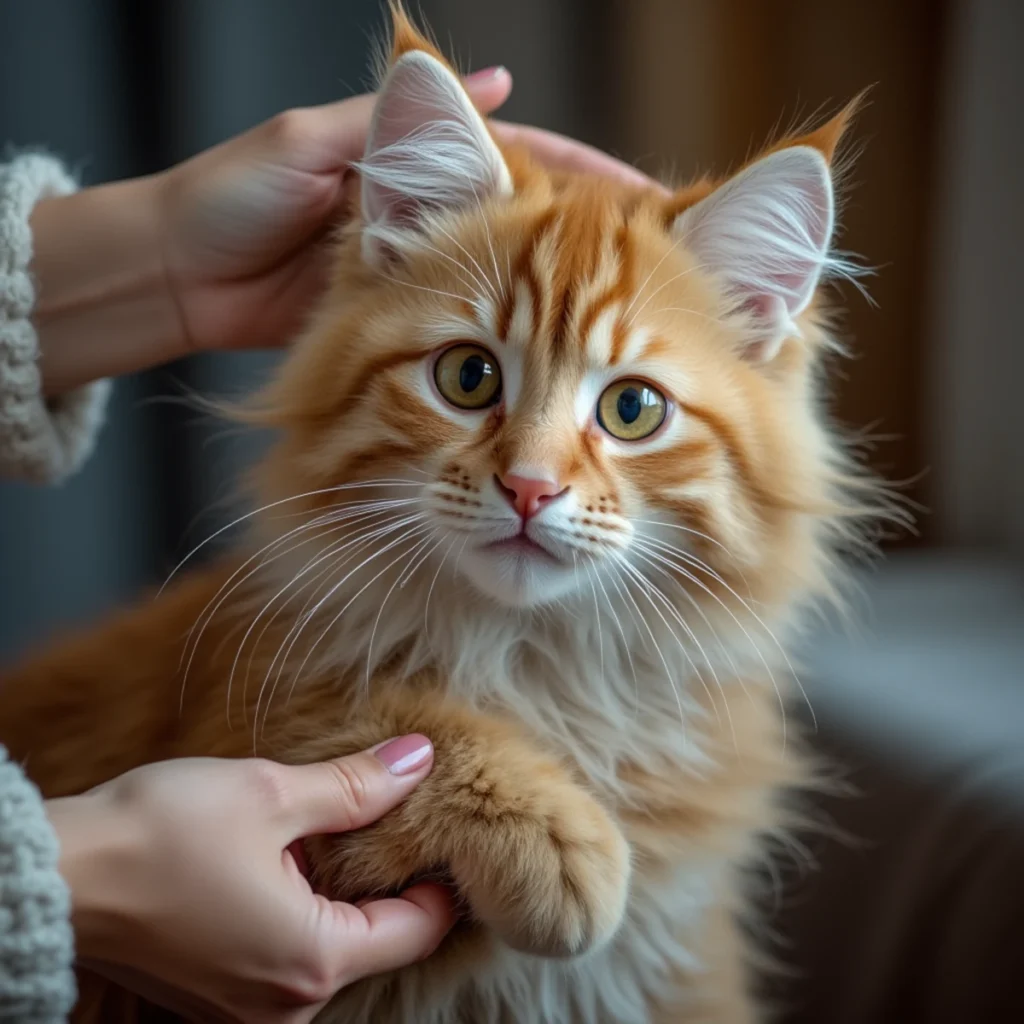- Why Are Maine Coon Cats So Special? Exploring Their Unique Traits and Personality
- Maine Coon’s Impressive Physical Characteristics
- Maine Coon Personality : Gentle Giants with a Loyal Heart
- Understanding Maine Coon Health Needs
- Feeding Your Cat: A Nutrient-Rich Diet is Key
- Grooming: Keeping Their Coat in Prime Condition
- Training Your Maine Cat: Smart, Social, and Willing
- Why Maine Cats Thrive in Families
- Should You Adopt a Maine Coon?
- Conclusion
- FAQs
Why Are Maine Coon Cats So Special? Exploring Their Unique Traits and Personality
Are you drawn to the idea of owning a Maine Coon cat but curious about why they’re so unique? These cats are known for their massive size and gentle nature, often called “gentle giants.” However, Maine Coon cats offer so much more beyond their captivating appearance and mild manners. This article delves into everything that makes the Maine Coon extraordinary, from its rich history to its distinct physical characteristics and irresistible personality.
A Brief History of the Maine Coon Cat
The origins of the Maine Coon are shrouded in mystery, yet this cat breed has long fascinated cat lovers worldwide. Though there are many tales regarding how they came to be, one common theory suggests that Maine Coon cats developed naturally in North America, with the first sightings reported in Maine, USA. Another legend claims they were brought over by Viking ships, where they bred with native cat species. Despite the tales, Maine Coon cats are regarded as one of the oldest native breeds in North America, officially recognized in the state of Maine.
This historical backdrop adds to their mystique, as does their rugged build, suited to cold New England winters. Their thick coats, bushy tails, and muscular bodies suggest an evolution adapted to survive chilly climates and rough terrains.
Maine Coon’s Impressive Physical Characteristics
Maine Coon cats are one of the largest domestic cat breeds, often weighing between 10 and 25 pounds, with some males even exceeding this range. But size isn’t their only notable trait—Maine Coons possess a variety of unique physical characteristics that set them apart:
- Fluffy, Water-Resistant Coat: Their double-layered coat is thick and water-resistant, helping them stay warm and dry in the winter.
- Large, Bushy Tail: Their tail, often as long as their body, provides warmth by curling around their bodies when they sleep.
- Ear Tufts: Tufts of fur sprouting from their ears give them a “lynx-like” look.
- Wide Eyes and High Cheekbones: With almond-shaped eyes and high cheekbones, Maine Coons have a distinct, expressive face.
| Characteristic | Description |
|---|---|
| Weight | 10 to 25 pounds |
| Coat Type | Thick, water-resistant |
| Tail | Long and bushy, used for warmth |
| Ear Tufts | Yes, resembles lynx-like features |
| Eyes and Cheekbones | Wide-set eyes, high cheekbones |
Maine Coon Personality : Gentle Giants with a Loyal Heart

Beneath the Maine Coon’s robust exterior lies a personality as gentle as it is loyal. Often known as the “dog of the cat world,” Maine Coons are known to bond closely with their human families. They’re highly affectionate, playful, and typically get along with other pets and children. But what exactly makes them different from other breeds in terms of temperament?
- Loyal and Affectionate: They tend to form deep bonds with family members, often choosing one “favorite” person to whom they stay close.
- Curious and Intelligent: Maine Coons love exploring and figuring out their surroundings.
- Playful Nature: Even as adults, these cats maintain a kitten-like playfulness. They often enjoy interactive toys, games of fetch, and puzzle games that stimulate their mind.
- Adaptable and Social: Maine Coons are not overly skittish around strangers and adapt well to different environments. This trait makes them ideal for families and even people with other pets.
Understanding Maine Coon Health Needs
Maine Coons generally enjoy robust health, but they’re prone to certain conditions that can affect their well-being. Being aware of these health concerns is essential to keep your Maine Coon healthy and happy:
- Hip Dysplasia: Due to their size, Maine Coons are susceptible to hip dysplasia, a condition that affects the hip joints.
- Hypertrophic Cardiomyopathy (HCM): HCM is a heart disease that’s relatively common among Maine Coons and requires regular check-ups.
- Dental Issues: Maintaining oral hygiene is crucial, as Maine Coons may develop periodontal disease.
Preventive veterinary care, along with a balanced diet and regular exercise, can help mitigate these health risks and ensure your Maine Coon leads a long, healthy life.
Feeding Your Cat: A Nutrient-Rich Diet is Key
The Maine Coon’s larger size and active nature require a well-balanced diet that meets their nutritional demands. Here’s a breakdown of some dietary guidelines to follow:
| Nutrient | Importance for Maine Coons |
|---|---|
| High Protein | Supports muscle health and growth |
| Healthy Fats | Maintains coat health and energy levels |
| Vitamins & Minerals | Helps in overall immunity and wellness |
| Fiber | Aids digestion and helps control weight |
Their diet should be high in protein and include healthy fats to support their coat and energy needs. Maine Coons benefit from a mix of dry and wet food to ensure they stay hydrated while meeting their nutrient requirements. Avoid low-quality cat foods, as they may lack essential nutrients or include fillers that don’t support your Maine Coon’s health.
Grooming: Keeping Their Coat in Prime Condition

A Maine Coon’s luxurious coat demands regular grooming, as it tends to shed and mat if not properly maintained. Here are some essential grooming tips:
- Brushing: Aim to brush their coat two to three times a week to prevent mats.
- Nail Clipping: Their nails need regular trimming, as Maine Coons are often active climbers.
- Dental Care: Dental hygiene is critical to avoid issues; use cat-friendly toothbrushes and toothpaste.
Investing time in grooming not only keeps your Maine Coon’s coat beautiful but also strengthens your bond with your cat, as they often enjoy the attention.
Training Your Maine Cat: Smart, Social, and Willing
Maine Coon cats have a reputation for being smart and eager to learn. Unlike many cat breeds, they’re open to training and can even learn tricks and commands similar to dogs. This is the way to begin with training:
- Leash Training: Maine Coons can be trained to walk on a leash, offering them the chance to explore the outdoors safely.
- Litter Box Habits: Start early with litter box training. This breed generally takes well to clean and structured environments.
- Basic Commands: Maine Coons can learn basic commands such as “sit,” “come,” and “stay” with positive reinforcement.
Why Maine Cats Thrive in Families
If you’re considering adding a Maine Coon to your family, you’ll be glad to know they’re among the best family pets. Their laid-back nature means they’re typically good with children and other pets. They’re social without being overly demanding and adapt well to busy household dynamics. Maine Coons often have a playful side that children love, but they’re also gentle, ensuring safe interactions with younger family members.
Should You Adopt a Maine Coon?
Maine Coon cats make fantastic companions for those willing to dedicate time to grooming and interaction. If you’re looking for a cat that’s gentle, intelligent, and a joy to be around, a Maine Coon may be the perfect addition to your home.
Conclusion
In summary, Maine Coon cats combine beauty, intelligence, and a gentle nature, making them wonderful companions for those willing to meet their needs. Whether you’re drawn to their unique appearance or affectionate personality, Maine Coons have a way of becoming cherished family members.
FAQs
Though large, Maine Coons don’t require a vast amount of space. They adapt well to apartments, provided they have engaging activities and climbing options.
No, Maine Coons are not hypoallergenic. They generate identical allergens to those of other breeds of cats.
Maine Coons have a lifespan of 12 to 15 years when given appropriate care.
While Maine Coons are more independent than some cats, they thrive with social interaction. If you work long hours, consider adopting a second pet to keep them company.
Maine Coons don’t need to go outside but enjoy walks on a leash or a secure, enclosed outdoor area where they can safely explore.


